
Hello, fellow thinkers and curious minds! If you’ve ever pondered the deeper questions of existence, purpose, and individual freedom, then you’re about to embark on a literary journey that will not only challenge your thoughts but also expand your understanding of the world around us. Existentialism, with its rich philosophical tradition, explores the very essence of being human in an indifferent universe. It’s a realm where questions are more abundant than answers, and every insight opens the door to new inquiries.
Existentialism offers a philosophical framework for understanding the individual’s search for meaning, the complexities of human existence, and the challenges of facing a seemingly chaotic and indifferent world. Humans are seen as free and responsible agents who create meaning and purpose in life. They make choices and are responsible for the consequences of those choices.
The starting point of existentialism as a distinct philosophical movement is attributed to the 19th-century Danish philosopher Søren Kierkegaard. While existentialist themes are traced back to earlier thinkers such as Friedrich Nietzsche and Fyodor Dostoevsky, Kierkegaard is considered existentialism’s precursor and foundational figure.
Kierkegaard’s philosophical writings, particularly his work on existential questions of individual existence, freedom, and subjectivity, laid the groundwork for later existentialist thinkers. He emphasized the importance of personal choice, individual responsibility, and the struggle for authenticity in the face of societal pressures and existential dilemmas.
Existentialism as a recognized philosophical movement gained prominence in the 20th century, particularly with the works of Jean-Paul Sartre, Albert Camus, and Simone de Beauvoir. These thinkers further developed and expanded upon existentialist ideas, exploring concepts such as the absurdity of existence, the search for meaning, and individuals’ inherent freedom and responsibility.
So, whether you’re a seasoned philosopher or a curious newcomer eager to dive into existential thought, the following selection of books will offer you a fascinating glimpse into the existentialist perspective. Let’s explore the depths of human existence together, navigating through the pages of some of the most thought-provoking works ever written. Fasten your seatbelt; it’s going to be an enlightening ride!
10 Books About Existentialism (Philosophical Books)
Existentialist works examine the complexities of the human experience, including themes of anxiety, alienation, authenticity, and the search for purpose. By immersing yourself in these narratives, you gain a deeper understanding of the complexities of human existence and the challenges we face in struggling with life. Many books in the existentialist genre are celebrated as literary and philosophical masterpieces. They are known for their evocative writing styles, depth of thought, and lasting impact on literature and philosophy.
Here, I will discuss ten books on existentialism. They provide opportunities for intellectual exploration, personal growth, and a deeper understanding of the human experience. Let’s begin!
1. The Stranger by Albert Camus
The Stranger (French: “L’Étranger”) was first published in 1942 and became a classic existentialist literature classic. The story is narrated by Meursault, an emotionally detached protagonist who lives a mundane and seemingly purposeless life.
The novel begins with the death of Meursault’s mother, and the narrative unfolds. His lack of conventional emotional responses and his apparent indifference to societal norms become apparent. He forms a relationship with a former co-worker (Marie) and becomes involved in a conflict that leads to an act of violence.
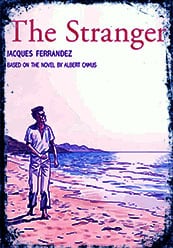
Throughout the story, Meursault grapples with existential questions, such as the nature of human existence, the meaning of life, and the absurdity of the universe. The story explores alienation, freedom, the indifference of the world, and the consequences of living following one’s values, even in the face of societal judgment.
The author raises thought-provoking questions about the human condition and the search for meaning in an absurd world. The Stranger is only one of Camus’s works and is studied in conjunction with his other philosophical essays, such as “The Myth of Sisyphus.” Together, these writings contribute to Camus’s broader exploration of existentialism and his philosophy of the absurd.
2. Nausea by Jean-Paul Sartre
Nausea (French: “La Nausée”) is a philosophical novel published in 1938. It is considered one of Sartre’s most influential works and a key text of existentialist literature. The book explores existentialism, the nature of consciousness, and the human experience.
The story is narrated by Antoine Roquentin, a solitary historian who starts to experience a profound sense of existential nausea and disgust with the world around him. He becomes acutely aware of the absurdity and meaninglessness of existence, grappling with questions about identity, authenticity, and the struggle to find meaning in a seemingly indifferent universe.
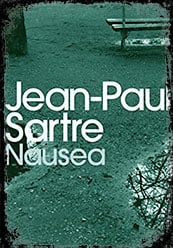
Throughout the novel, Roquentin reflects on his existence, encounters with other people, and objects surrounding him. His observations lead him to question the fundamental nature of reality and to confront the anguish and despair that arise from an awareness of his freedom and responsibility.
You can explore the limits of human understanding, the subjective nature of experience, and the tension between individual freedom and the constraints of society. A fundamental sense of disorientation, alienation, and anguish marks human existence. It remains a significant work in the existentialist tradition and a thought-provoking examination of the human condition.
3. Being and Nothingness by Jean-Paul Sartre
Being and Nothingness is a philosophical work that is considered one of Sartre’s major works and a foundational text of existentialist philosophy. The book explores the nature of human consciousness, existence, and the concept of freedom.
Sartre describes his philosophical system known as phenomenological ontology. He examines the fundamental concepts of being, nothingness, consciousness, and the relationship between the self and the world. Also, he argues that human beings are free and responsible for creating their meaning and values in an inherently meaningless universe.
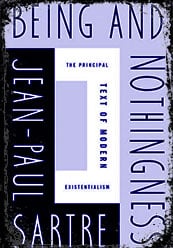
The book explores the concept of “being-for-itself” (pour-soi), which refers to human consciousness and its constant pursuit of meaning and identity. Sartre contrasts this with “being-in-itself” (en-soi), which represents the inanimate and static objects of the world.
Throughout the book, we get to see various aspects of human existence, including perception, emotions, relationships, and the experience of others. The author analyzes the phenomenon of “bad faith” (mauvaise foi), in which individuals evade their responsibility and freedom by conforming to social expectations and denying their agency.
Every page has profoundly impacted philosophy, psychology, and literary theory, influencing subsequent thinkers and serving as a cornerstone of existentialist thought. However, due to its philosophical depth, it is regarded as a challenging read, requiring careful study and reflection.
4. Thus Spoke Zarathustra by Friedrich Nietzsche
Thus Spoke Zarathustra (German: “Also sprach Zarathustra”) is a philosophical novel published between 1883 and 1885. It is one of Nietzsche’s most famous and influential works, presenting his ideas on morality, human nature, and the concept of the “overman” or “superman.”

The book takes the form of a narrative in which the central character, Zarathustra, a fictionalized version of the ancient Persian prophet Zoroaster, descends from his mountain retreat to share his philosophical teachings with humanity. Zarathustra challenges conventional morality, religious beliefs, and societal norms, urging individuals to embrace their will to power and overcome the limitations imposed by tradition and herd mentality.
This philosophical book covers eternal recurrence, the death of God, the rejection of conventional morality, and the pursuit of excellence. Nietzsche employs a poetic and aphoristic style to convey his ideas, using allegory, parables, and vivid imagery. People who are ambitious for their desires, passions, and instincts to achieve self-mastery and personal fulfillment can learn many valuable lessons.
5. The Myth of Sisyphus by Albert Camus
The Myth of Sisyphus is a philosophical essay published in 1942. In this influential work, Camus explores the absurdity of human existence and the search for meaning in a world devoid of inherent purpose.
The essay takes its name from the Greek mythological figure Sisyphus, condemned by the gods to repeatedly roll a boulder up a hill, only to watch it roll back down, requiring him to start the task anew for eternity. Camus uses this myth as a metaphor for the human condition, suggesting that life is inherently absurd and devoid of ultimate meaning.
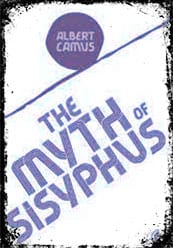
The author argues that the human desire for coherence and meaning clashes with the inherent irrationality and indifference of the universe. Despite this, he asserts that anyone can find meaning and purpose by embracing the absurdity of existence and fully engaging in the present moment rather than seeking external validation or pursuing grand philosophical systems.
The essay examines different philosophical perspectives on the absurd, including the existentialist notion of facing the absurd with courage and authenticity. Camus suggests that by acknowledging and accepting the absurdity of life, people can find freedom and live with a sense of rebellion against the meaninglessness of existence.
6. Existentialism Is a Humanism by Jean-Paul Sartre
Existentialism Is a Humanism (French: “L’Existentialisme est un humanisme”) is a classic non-fiction French literature and philosophical essay originally presented as a lecture in 1945. The essay serves as a concise introduction to Sartre’s existentialist philosophy and addresses criticisms and misconceptions associated with the movement.
Sartre emphasizes the core principles of existentialism, focusing on human freedom, responsibility, and the nature of existence. He argues that existentialism places human beings at the center of their existence and emphasizes their capacity to shape their lives through choices and actions.
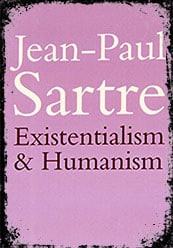
Thus, existentialism emphasizes personal responsibility and the idea that humans are accountable for their choices. The essay also addresses criticism that existentialism leads to nihilism or moral relativism. On the contrary, existentialism promotes ethical values rooted in human subjectivity and emphasizes the importance of choices and their impact on others. The author suggests that authentic existence involves recognizing one’s freedom and acting in a way that respects the freedom of others.
7. The Plague by Albert Camus
The Plague” (French: “La Peste”) is a literary fiction published in 1947. It tells the story of a fictional town called Oran in Algeria that is struck by a deadly outbreak of the bubonic plague. Through this allegorical story, Camus explores existential themes and the human response to suffering, death, and the absurdity of life.
The book follows a diverse cast of characters, including Dr. Bernard Rieux, who becomes one of the primary narrators. It examines the impact of the plague on the town and its inhabitants, focusing on the epidemic’s physical, emotional, and psychological effects.
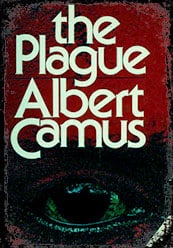
As the town is quarantined, the characters confront their mortality and grapple with questions of meaning, purpose, and the struggle to find hope and solidarity in the face of adversity. Camus uses the plague as a metaphor for the human condition and the absurdity of existence.
He explores existentialism, the nature of suffering, the inevitability of death, and the capacity for compassion and resilience in the face of despair. By portraying the townspeople’s responses to the plague, he examines human behavior, moral choices, and the search for meaning in a chaotic world.
8. No Exit by Jean-Paul Sartre
No Exit is a classic existentialist play, first performed in 1944, covers human existence and self-deception. It takes place in a single room in hell and features three characters: Garcin, Inez, and Estelle. Each character has been condemned to spend eternity together, their punishment being that they cannot escape or find solitude. They interact and engage in conversations, and their true natures and inner conflicts are gradually revealed.

The play explores the idea that hell is not a physical place with fiery torment but rather an existence in which people are forced to confront their insecurities, desires, and the judgments of others. It emphasizes the existentialist notion that humans are condemned to be free and responsible for their actions and choices.
The characters are tormented by their self-deception and the constant presence of others, which leads to a breakdown of their facades and exposes their true selves. The play raises questions about authenticity, the struggle for recognition, and the impossibility of escaping one’s consciousness.
9. The Trial by Franz Kafka
The Trial (German: “Der Prozess”) is a classic German literature published posthumously in 1925. It tells the story of Josef K., a bank employee arrested and subjected to a baffling and absurd legal process without being informed of the charges against him.

The novel follows Josef K.’s futile attempts to face the labyrinthine bureaucracy and discover why he is being prosecuted. As he interacts with various officials and meets the enigmatic and oppressive nature of the legal system, he becomes increasingly trapped in a nightmarish world where guilt and punishment are elusive concepts.
This dystopian novel raises questions about the nature of justice, the complexities of societal norms, and how anyone can be subjected to forces beyond their control. Kafka examines the existential predicament of the individual confronted with the absurdity and uncertainty of existence while also highlighting the anxiety and isolation that can arise from a lack of agency in the face of external forces.
10. The Ethics of Ambiguity by Simone de Beauvoir
The Ethics of Ambiguity is a philosophical work published in 1947. It is considered one of de Beauvoir’s key philosophical texts, exploring existentialist ethics and the concept of freedom in the face of ambiguity. Beauvoir argues that human existence is inherently ambiguous and that people must confront this ambiguity in their ethical choices. She emphasizes the importance of embracing one’s freedom and taking responsibility for one’s actions while acknowledging the uncertainty and complexity of moral decision-making.
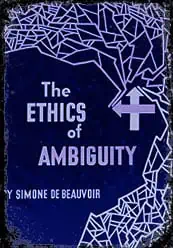
De Beauvoir critiques traditional ethical systems that seek to provide fixed and universal moral codes, arguing that they often limit individual freedom and fail to account for individuals’ unique circumstances and subjective experiences. She proposes an ethics based on recognizing ambiguity and the imperative to create one’s values and commitments.
The book explores the relationship between freedom and responsibility, the struggle for authenticity, and the significance of personal relationships and social structures in ethical decision-making. After finishing the book, I examined the implications of her existentialist ethics for gender relations that emphasize the importance of women’s liberation and the dismantling of oppressive social structures.
The book continues to be widely read and studied for its exploration of existentialist ethics, its feminist perspectives, and its examination of the ethical implications of living in a world marked by ambiguity and freedom. I always recommend it to those who are seeking life meaning and purpose. If you are a beginner of existentialism, then start with it.
5 Modern Existentialist Novels
“The Unbearable Lightness of Being” by Milan Kundera – This novel explores the concepts of lightness and weight as metaphors for the existential challenges faced by its characters. Set against the backdrop of the Prague Spring of 1968, it delves into the lives of a small group of characters, exploring their personal quests for meaning, love, and identity in a transient world.
“Nausea” by Jean-Paul Sartre – Although published in 1938, “Nausea” remains a seminal work of modern existentialist literature. It tells the story of Antoine Roquentin, a man who becomes increasingly aware of the absurdity of existence through a profound sense of nausea. Sartre uses Roquentin’s experiences to examine themes of freedom, alienation, and the search for meaning.
“The Stranger” by Albert Camus – Another cornerstone of existentialist literature, “The Stranger” explores the life of Meursault, an indifferent French Algerian who unwittingly becomes involved in a murder. Camus uses Meursault’s story to explore themes of absurdity, the indifference of the universe, and the necessity of forging one’s path and meaning in life.
“Invisible Man” by Ralph Ellison – Ellison’s novel, while categorized as a work of social commentary, also deeply engages with existentialist themes. It tells the story of an unnamed African American protagonist’s journey to find his identity and place in a society that seeks to render him invisible. The novel explores the existential quest for self-definition against the backdrop of racial injustice.
“Fight Club” by Chuck Palahniuk – A more contemporary take on existentialism, “Fight Club” explores themes of identity, consumerism, and personal liberation. Through the experiences of its unnamed protagonist and his alter ego, Tyler Durden, the novel critiques the emptiness of modern life and the search for meaning in a materialistic society.
Beginner Guide For Reading Existentialism
If you’re interested in exploring existentialism, several key works and authors are recommended as starting points. Here are a few suggestions to help you get started:

The Stranger by Albert Camus: This novel briefly introduces existentialist themes and concepts. It explores the philosophy of the absurd, the search for meaning in an indifferent world.
Existentialism Is a Humanism by Jean-Paul Sartre: This essay is a clear and accessible introduction to Sartre’s existentialist philosophy. It addresses criticisms and misconceptions of existentialism and offers insights into the nature of human freedom, responsibility, and the creation of meaning.
Nausea by Jean-Paul Sartre: This philosophical novel shows the protagonist’s existential crisis and explores themes of existence, freedom, and the search for meaning.
The Myth of Sisyphus by Albert Camus: In this philosophical essay, Camus explores the concept of the absurd and questions whether life is worth living in the face of an indifferent and meaningless universe.
Being and Nothingness by Jean-Paul Sartre: This dense and comprehensive work is a major contribution to existentialist philosophy. It shows Sartre’s philosophical system, exploring the nature of consciousness, freedom, and the construction of meaning in an absurd world.
These books provide a solid foundation for understanding existentialism and its key concepts. Approach these texts with an open mind, as existentialist philosophy can be challenging and thought-provoking. Engaging with different authors and perspectives within existentialism can further enrich your understanding of this philosophical tradition.
How do students learn with existentialism?
When students engage with existentialism, they typically explore its philosophical concepts, themes, and perspectives through a combination of reading primary texts, engaging in critical analysis, and participating in discussions. Here are some common approaches to learning about existentialism:
Reading primary texts: Students begin by reading key works by existentialist philosophers such as Jean-Paul Sartre, Albert Camus, and Søren Kierkegaard. This allows them to engage with the primary sources directly and understand existentialist ideas and arguments firsthand.
Analyzing philosophical texts: Students learn to analyze and interpret existentialist texts, examining the philosophical concepts, arguments, and themes presented. They develop skills in close reading, identifying key ideas, and critically evaluating philosophical reasoning.
Contextualizing existentialism: Students explore the historical and intellectual context in which existentialism emerged. They study the cultural, social, and philosophical developments that influenced existentialist thought, such as the impact of World War II, post-war disillusionment, and broader philosophical movements like phenomenology.
Discussing existentialist themes: Class discussions allow students to delve into existentialist themes and critically reflect. They may explore topics such as freedom, authenticity, anxiety, the meaning of life, the nature of existence, and the human condition. Through discussion, students can share their interpretations, ask questions, and consider different perspectives.
Overall, the study of existentialism involves an engagement with primary texts, critical analysis, philosophical inquiry, and thoughtful reflection. Through these methods, students develop a deeper understanding of existentialist ideas, enhance their critical thinking skills, and cultivate self-reflection and existential exploration capacity.
Famous existentialist philosophers
Existentialism is a philosophical movement that encompasses various thinkers and perspectives. Here are some key existentialist philosophers who have made significant contributions to the development of existentialist thought:
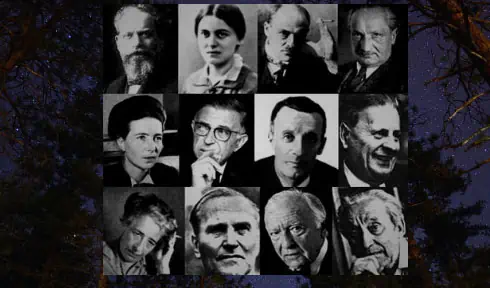
Søren Kierkegaard: Kierkegaard emphasized individual subjectivity, personal choice, and the role of faith in the face of existential dilemmas.
Friedrich Nietzsche: Nietzsche’s work explores themes such as the death of God, the affirmation of life, and the individual’s search for meaning and self-creation.
Jean-Paul Sartre: Sartre is one of the most prominent existentialist philosophers. His works, including “Being and Nothingness” and “Existentialism Is a Humanism,” focus on themes such as freedom, responsibility, and the concept of “existence precedes essence.”
Albert Camus: Camus is known for his exploration of the absurdity of life and the confrontation with mortality. His works, including “The Stranger” and “The Myth of Sisyphus,” cover existentialist themes of meaning, rebellion, and the human condition.
Simone de Beauvoir: De Beauvoir’s writings, including “The Second Sex” and “The Ethics of Ambiguity,” offer feminist perspectives within existentialism. She examines freedom, gender, and the role of social structures in shaping individual existence.
Martin Heidegger: Heidegger’s philosophy explores questions of being and existence. While his work predates the label of existentialism, his ideas have influenced existentialist thought, particularly through his concept of “authenticity” and his analysis of human existence.
Gabriel Marcel: Marcel’s works explore the nature of human relationships, the experience of embodied existence, and the importance of existential hope and engagement with the world.
These philosophers represent a selection of the diverse range of thinkers associated with existentialism. Each has offered unique insights into the human condition, personal freedom, and the search for meaning in a seemingly indifferent universe.
Four major themes of Existentialism
Several recurring themes are associated with this philosophical movement. There is no definitive list of themes! Here are four major themes commonly found in existentialist thought:
Existence precedes essence: Existentialism emphasizes the belief that individuals exist first and then define themselves through their actions, choices, and experiences. According to this view, there is no predetermined essence or fixed human nature. Instead, individuals have the freedom and responsibility to create meaning and purpose in life.
Authenticity and individuality: Existentialism strongly emphasizes personal authenticity and the individual’s search for self-definition. It encourages individuals to face their unique experiences, values, and desires rather than conforming to societal expectations or relying on external authorities for guidance. Authenticity involves taking ownership of one’s choices and living by one’s true self.
Anxiety and absurdity: Existentialism addresses the inherent anxiety and angst that arise from the human condition. It explores the tension between the human desire for meaning and the apparent indifference or absurdity of the world. Existentialists recognize that life is filled with uncertainties, contradictions, and the inevitability of death, which can lead to feelings of unease and a search for purpose.
Freedom and responsibility: Existentialism places a strong emphasis on freedom and the inherent responsibility that accompanies it. Existentialists believe that humans are fundamentally free to make choices, but this freedom also entails the responsibility for the consequences of those choices. It emphasizes the importance of personal agency, ethical decision-making, and recognizing one’s impact on others.
These themes provide a framework for understanding existentialist thought. Different existentialist philosophers may emphasize certain themes over others, and individual interpretations and variations exist within the movement.
Last Words
Existentialism is not just a philosophical stance; it’s a way of living, a lens through which we can view our lives and the choices we make. Let these works inspire you, challenge you, and perhaps even change the way you see the world. Embrace the uncertainty, revel in the freedom of choice, and continue to seek out the answers to your existential questions.
The adventure of self-discovery and understanding the essence of being is a never-ending journey, and we’re so glad you’ve taken a step further on this path with us. Until next time, keep pondering, exploring, and questioning. Happy reading!
Read more:
10 Most Difficult Philosophy Books
Roman Philosophy Books About Cicero
Table of Contents
